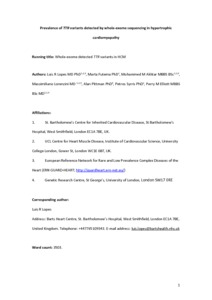Lopes, LR; Futema, M; Akhtar, MM; Lorenzini, M; Pittman, A; Syrris, P; Elliott, PM
(2019)
Prevalence of TTR variants detected by whole-exome sequencing in hypertrophic cardiomyopathy.
Amyloid, 26 (4).
pp. 243-247.
ISSN 1744-2818
https://doi.org/10.1080/13506129.2019.1665996
SGUL Authors: Pittman, Alan Michael
![[img]](https://openaccess.sgul.ac.uk/111625/1.hassmallThumbnailVersion/Da%20Rocha%20Lopes_Prevalence%20of%20TTR%20variants%20detected%20by%20whole-exome%20sequencing%20in%20hypertrophic%20cardiomyopathy_AAM.pdf)  Preview |
|
PDF
Accepted Version
Available under License ["licenses_description_publisher" not defined].
Download (867kB)
| Preview
|
Abstract
Background: A proportion of patients with hypertrophic cardiomyopathy (HCM) have a diagnosis of cardiac amyloidosis. Hereditary transthyretin amyloid cardiomyopathy (ATTRv-CM) is caused by mutations in the TTR gene. Our aim was to study the prevalence of potentially amyloidogenic TTR variants in a whole-exome sequencing (WES) study of a large HCM cohort. Methods and results: 770 consecutive HCM probands underwent WES and clinical characterisation. Patients with rare or known pathogenic variants in TTR underwent 99mTechnetium labelled 3,3-diphosphono-1,2-propanodicarboxylic acid (DPD) scintigraphy and were retrospectively re-assessed for clinical features of amyloidosis. Two patients had rare TTR variants of unknown significance and four had the known pathogenic V122I (p.V142I) variant (one homozygous and also heterozygous for a likely pathogenic MYL3 variant and another double heterozygous for a likely pathogenic MYBPC3 variant). Four out of 6 patients with TTR variants underwent DPD scintigraphy; the only positive study was in the patient with the homozygous V122I (p.V142I) variant. Conclusions: Pathogenic TTR variants are rare in carefully assessed HCM patients and may occur in double heterozygosity with pathogenic sarcomere variants. The lack of evidence for an amyloidosis phenotype in all but one TTR variant carrier illustrates the importance of complete clinical evaluation of HCM patients that harbour pathogenic TTR variants.
| Item Type: |
Article
|
| Additional Information: |
This is an Accepted Manuscript of an article published by Taylor & Francis in Amyloid: The Journal of Protein Folding Disorders on 25/09/2020, available online: http://www.tandfonline.com/10.1080/13506129.2019.1665996. |
| Keywords: |
Hereditary transthyretin amyloidosis, hypertrophic cardiomyopathy, whole-exome sequencing, Hereditary transthyretin amyloidosis, hypertrophic cardiomyopathy, whole-exome sequencing, 1103 Clinical Sciences, 1109 Neurosciences, 0601 Biochemistry and Cell Biology, Biochemistry & Molecular Biology |
| SGUL Research Institute / Research Centre: |
Academic Structure > Molecular and Clinical Sciences Research Institute (MCS) |
| Journal or Publication Title: |
Amyloid |
| ISSN: |
1744-2818 |
| Language: |
eng |
| Dates: |
| Date | Event |
|---|
| December 2019 | Published | | 25 September 2019 | Published Online | | 6 September 2019 | Accepted |
|
| Publisher License: |
Publisher's own licence |
| Projects: |
|
| PubMed ID: |
31554435 |
 |
Go to PubMed abstract |
| URI: |
https://openaccess.sgul.ac.uk/id/eprint/111625 |
| Publisher's version: |
https://doi.org/10.1080/13506129.2019.1665996 |
Statistics
Item downloaded times since 05 Feb 2020.
Actions (login required)
 |
Edit Item |



